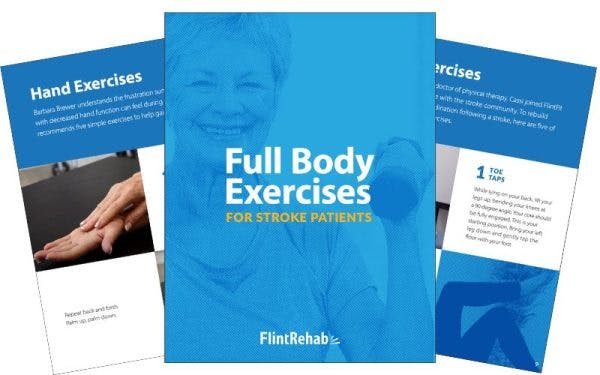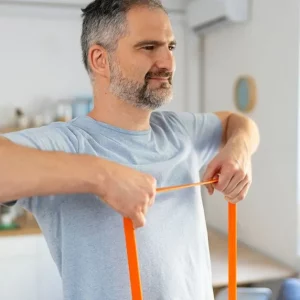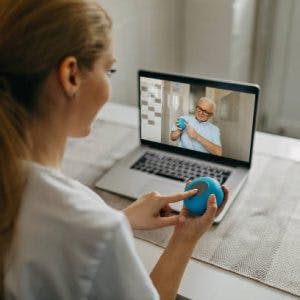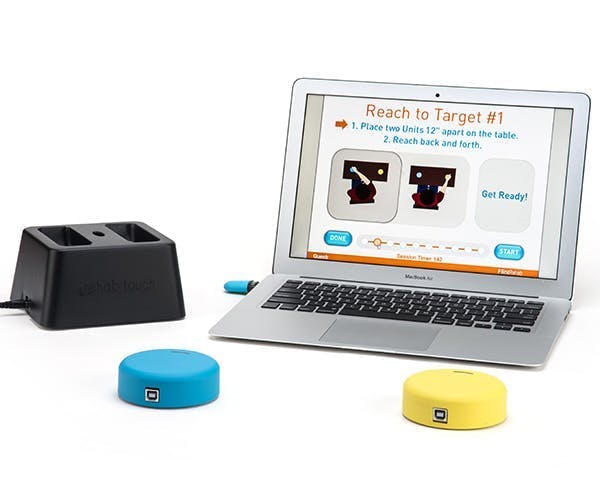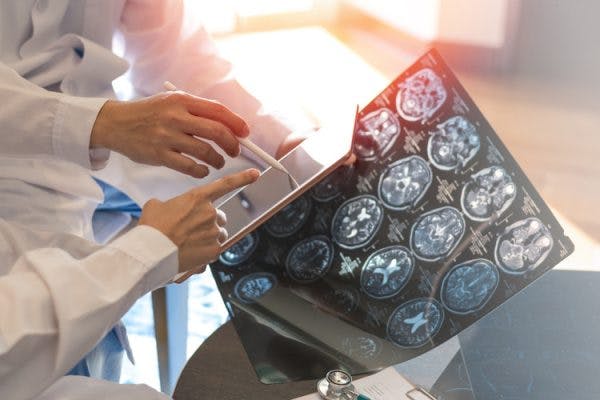More than one third of survivors experience difficulties with memory after stroke. Some individuals may have problems with remembering new information, while others may struggle to recall past memories. Fortunately, with cognitive rehabilitation, it is possible to improve memory after stroke.
This article describes why memory may be affected after stroke and provides an overview of a few techniques that may be recommended to improve memory. Use the links below to jump straight to any section:
- Can a Stroke Cause Memory Loss
- Looking at the Relationship Between Memory and Stroke
- What Kind of Stroke Causes Memory Loss
- How to Improve Memory After Stroke
- Compensation Strategies for Memory After Stroke
- How to Improve Short Term Memory After Stroke
- Can Memory Improve After Stroke Without Rehab?
Can a Stroke Cause Memory Loss? Why Memory Difficulties Occur After Stroke
Yes, a stroke can cause memory loss—this is one of the most common cognitive effects survivors experience. Memory problems after stroke can affect short-term recall, long-term storage, or both. Some individuals may struggle to remember recent conversations, appointments, or where they left personal belongings. Others may find it difficult to recall names, past events, or familiar routines.
These challenges occur because a stroke disrupts blood flow to parts of the brain that are responsible for memory processing. Depending on the area affected, survivors may experience different types and severities of memory issues. Fortunately, many people are able to make meaningful improvements through rehabilitation and cognitive retraining.
Looking at the Relationship Between Memory and Stroke
Memory involves three steps: creating the memory by encoding information, storing information for short or long periods of time, and recalling stored information when desired. There are a number of types of memory, including:
- Episodic memory: used for past or recent events and experiences
- Prospective memory: involves remembering future activities
- Semantic memory: used for concrete information, like facts and concepts
- Verbal memory: includes words, stories, or other verbally presented information
- Visual memory: used to recall pictures, faces, routes or other visual information
- Working memory: similar to a mental sticky note; provides temporary storage for a small amount of readily accessible information
Following a stroke, survivors may have difficulties with one or more of these types of memory, depending on which areas of the brain were affected. For example, a stroke in the hippocampus may affect the ability to form new memories, while episodic memories may be disrupted after a thalamic or medial temporal lobe stroke.
Fortunately, cognitive rehabilitation can improve memory after a stroke. Cognitive rehabilitation involves retraining cognitive functions such as memory and, when necessary, teaching compensation strategies to cope with impaired skills.
Both speech-language pathologists (SLPs) and occupational therapists can address memory problems after stroke. Because memory difficulties and language impairments often overlap, SLPs can be great resources for survivors struggling with cognitive tasks. When cognitive challenges affect day-to-day activities, occupational therapists can collaborate with the survivor to adapt or modify activities and recommend compensatory strategies.
What Kind of Stroke Causes Memory Loss
Memory loss can result from any type of stroke, but the likelihood and type of memory impairment depend on the location and size of the stroke. Strokes that affect the following areas are most commonly associated with memory problems:
- Hippocampus: A region critical for forming new memories; damage here may impair the ability to retain new information.
- Thalamus: Involved in attention and memory processing; damage may result in thalamic amnesia, impacting the brain’s ability to recall, relay and integrate information.
- Frontal lobes: Responsible for working memory, decision-making, and attention; damage can lead to disorganized thoughts and difficulty staying focused.
- Temporal lobes: Important for verbal and visual memory; strokes in this area may affect the ability to remember words, faces, or sounds.
Both ischemic strokes (caused by blood clots) and hemorrhagic strokes (caused by bleeding in the brain) can result in memory loss. Even smaller strokes or transient ischemic attacks (TIAs) can cause subtle memory changes that may become more noticeable over time, especially if multiple events occur.
Improving Memory After a Stroke
The brain has an incredible ability to heal after injury and rewire itself. This process, known as neuroplasticity, allows the brain to adapt to experience to gain or regain functions after a neurological injury like a stroke.
Neuroplasticity is activated through massed practice, which involves consistently and repetitively performing specific tasks involving targeted skills. Over time, the brain adapts to activities practiced on a regular basis by strengthening associated neural pathways.
Therefore, in order to promote the recovery of memory skills through neuroplasticity, individuals are often recommended to consistently and repetitively practice memory-specific tasks and exercises. Consulting a speech-language pathologist and/or occupational therapist can be very beneficial, as these professionals can create personalized exercise programs and help determine whether other cognitive skills have been affected.
Strategies to Overcome Memory Challenges After a Stroke
There are two methods for overcoming memory deficits among stroke patients: rehabilitative exercise and compensation strategies. Rehabilitative exercise focuses on regaining memory functions by practicing cognitive exercises to encourage neuroplasticity. On the other hand, compensation strategies offer “shortcuts” around memory impairments by using specific techniques to improve functional performance despite memory deficits.
Let’s first take a look at strategies to overcome memory challenges after a stroke.
How to Improve Memory After Stroke
Here are some effective ways to improve memory after a stroke:
1. Engage in Cognitive Rehabilitation
Working with a speech-language pathologist (SLP) or occupational therapist is one of the best ways to target memory problems. These professionals can create personalized plans that:
- Address specific memory impairments (e.g. short-term, verbal, or visual memory)
- Integrate real-life tasks into therapy
- Adapt exercises as progress is made
Therapy sessions may involve exercises like repeating word lists, recalling stories, solving puzzles, or using digital tools that challenge memory in engaging ways.
2. Practice Memory-Boosting Activities at Home
Daily repetition of targeted exercises can help strengthen memory through consistent stimulation. Try incorporating the following into your routine:
- Memory card games (e.g. Concentration, Go Fish)
- Crossword puzzles or Sudoku
- Story retelling exercises (reading a short passage, then summarizing it aloud)
- Using mnemonic devices (e.g. acronyms, visual imagery)
Consistency is key—short, frequent practice sessions tend to be more effective than long, infrequent ones. If you’re having trouble with knowing where to start, ask your speech or occupational therapist for recommendations for an individualized home program.
3. Use Memory Compensation Strategies
While working on recovery, it’s helpful to use tools and techniques that compensate for memory lapses in daily life. Some proven strategies include:
- Setting alarms or reminders on your phone
- Keeping a daily planner or memory notebook
- Following structured routines for meals, medications, and appointments
- Labeling important objects around the home
- Using sticky notes or whiteboards for visible reminders
These tools reduce cognitive load and help stroke survivors stay organized and confident, even if memory is still recovering. An occupational therapist can provide you with more specific compensatory strategies to make day-to-day life easier during the recovery process.
As your memory improves, try to gradually reduce your use of these strategies, as over-reliance on compensatory strategies can limit progress.
4. Support Brain Health Holistically
Memory improvement isn’t only about doing exercises—it also depends on the brain’s overall health. Supporting recovery through healthy lifestyle choices can help optimize cognitive function:
- Regular aerobic exercise to increase blood flow to the brain
- Adequate sleep for memory consolidation
- A brain-friendly diet, such as the Mediterranean diet
- Stress management techniques, like meditation or deep breathing
These habits support neuroplasticity and improve the brain’s ability to form and retain memories.
5. Use Cognitive Therapy Apps Like CT Speech & Cognitive Therapy
Apps like the CT Speech & Cognitive Therapy make it easier than ever to continue memory training from home. Whether you’re recovering from stroke, traumatic brain injury (TBI), aphasia, or other neurological conditions, this app offers a personalized therapy experience tailored to your recovery goals.
Here’s how it helps improve memory and other cognitive skills:
- Customized therapy: Choose your rehab goals, and the app delivers targeted exercises based on your specific needs.
- Unmatched variety: Access the world’s most comprehensive library of evidence-based activities—with over 500,000 exercises across 90 therapy areas, all designed by neuroscientists and clinicians.
- Track your progress: Built-in performance reports help you (and your therapist) monitor progress in real time.
- Build key skills: Practice memory, attention, language, reading, writing, comprehension, problem solving, and more—all from one platform.
- Flexible rehab options: Use it independently at home, pair it with in-clinic therapy, or invite your clinician to guide and adjust your plan remotely.
Research shows that users of the CT app get five times more therapy practice and achieve faster improvement and better outcomes—making it a powerful tool for boosting memory recovery after stroke.
Want to learn more about the CT Speech and Cognitive Therapy App? Get Started Here.
(Link opens a pop-up for uninterrupted reading.)
Compensation Strategies for Memory Problems after Stroke
While recovering memory functions is ideal, it can be very helpful to learn how to compensate for memory problems. When memory challenges interfere with daily activities, occupational therapists can help survivors find effective techniques to promote functional independence despite memory deficits.
Here are some helpful compensation strategies that may be recommended:
- Reminder apps. Using a reminder app or preset alarm on one’s smartphone can help survivors stay on top of important activities, such as feeding a pet or going to therapy appointments. Individuals should try to keep their phone with them or set in the same place — ideally a central location that can be heard from most rooms.
- Routine. Setting a consistent routine for essential daily activities, such as taking prescribed medication, can also help with memory difficulties. When possible, try pairing activities together, such as always taking medications while eating breakfast.
- Simplification. Simplifying common activities, such as cooking, may also help compensate for memory deficits. For example, rather than making meals with longs lists of ingredients and steps, consider making less complicated foods or using precut fruits and vegetables.
- Lists. Finally, it can be helpful to use lists to ensure tasks are completed properly. Keeping a grocery list or a list of regular cleaning tasks that need to be completed each week can help individuals maintain their independence despite memory challenges.
Using a combination of rehabilitative exercises and compensation strategies can allow survivors to function optimally as they pursue recovery. Working with family members and the rehabilitative team can help survivors find the most beneficial strategies to promote both recovery and independence.
How to Improve Short-Term Memory After a Stroke
Short-term memory, often referred to as working memory, helps you hold small pieces of information temporarily—like remembering a phone number long enough to dial it. When this skill is affected by a stroke, everyday tasks like following directions, having conversations, or making decisions can feel overwhelming.
To improve short-term memory, survivors can try the following strategies:
- Practice recall activities: Simple tasks like repeating short lists, recalling numbers, or using memory apps can strengthen working memory.
- Use chunking and association techniques: Breaking information into smaller, meaningful chunks (like grouping grocery list items) makes it easier to remember.
- Repeat information out loud: Saying something multiple times, such as an appointment time or name, can reinforce recall.
- Limit distractions: Focused environments improve attention, which supports better memory encoding.
- Try digital tools: Apps with memory games or reminders can reinforce cognitive routines and reduce the burden of short-term memory lapses.
Pairing these exercises with structured routines and input from a speech-language pathologist can make a significant difference in restoring memory function and improving confidence in daily life.
Can Memory Improve without Rehabilitation?
While not always the case, it is possible for stroke-related memory deficits to improve on their own. This phenomenon, known as spontaneous recovery, usually occurs during the acute (early) stages of recovery.
There are a few possible reasons for this: 1) brain swelling is reducing during this time; 2) neuroplasticity is often heightened during the acute stage; and 3) the intensity of rehabilitation is usually highest while individuals participate in inpatient rehabilitation, which involves several hours of therapy per day during first few weeks to months after the stroke occurred.
While the idea of spontaneous recovery can provide hope, it should not be relied upon. Instead, a proactive approach is often best. By practicing cognitive rehabilitation exercises on a daily basis, individuals can encourage the brain to continue recovering well beyond the acute stages of recovery.
Improving Memory After Stroke
Impaired memory is a common cognitive effect of stroke that may be improved through rehabilitation. Speech-language pathologists and occupational therapists are experts on this issue. Together, they can create a rehabilitation plan tailored to the survivor’s strengths and needs.
The best way to improve memory after stroke is to practice memory-intensive cognitive rehabilitation exercises. However, if memory challenges persist, it may be beneficial to use compensation strategies to promote independence despite memory problems. While spontaneous recovery may occur and provide a boost in memory functions, pursuing rehabilitation is usually the best way to optimize outcomes.


